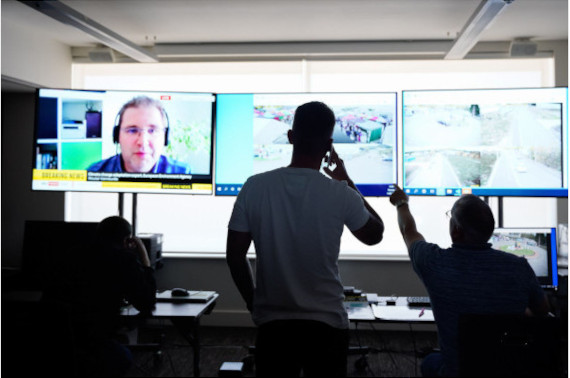Introduction
Responding to Terrorist Incidents – Security Control Room (SCR) Operators course was designed after deficiencies in organisational preparedness to attacks were identified in post incident reviews, exercises and simulations.
The course is specifically designed for operators who work in security control rooms within national infrastructure sites and crowded places.
The course offers world-first immersive exercises that simulate multiple terrorist incident scenarios, enabling delegates to practice decision-making in real-time, as if in a real control room and covers:
- Attack timelines
- Preparedness
- Detecting an Attack
- Command and Control
The five day course hosts a small number of delegates at a time (maximum 24) to enable delegates to get the most out of the experience, supported by expert trainers.
Spaces are available on SCR operators courses from November 2023 onwards. From 2024, all courses are being run from a venue in the Bedfordshire area.

Security Control Room Operators Course Overview
The worst thing that can happen you have to be ready for.
It’s always in the mind, to prepare ourselves for the worst day.
You never quite know what is around the corner.
We're a prime target for all the terror
threats you can think of.
Whether that was a marauding terrorist attack,
somebody with explosives.
Life is going to get real fast
when things go wrong for you.
Every second counts when something's happening.
How are you going to deal with that?
How are you going to react?
Can you withstand the pressure?
Could you really afford the possible outcome,
if something was to go wrong and you didn't manage it properly?
We have a duty of care to look after anybody that comes to Blackpool.
Obligations and responsibilities are that we must be as prepared as possible if there is an unfortunate incident.
We're a high footfall location.
It's down to us to ensure that we identify the threats and risks as they come through our doors.
Security control room is the glue that holds
every aspect of our security focus together.
We can have up to 50,000 people in this venue.
If you had somebody marauding through this place with 50,000 people in here it'd be catastrophic, really.
If there was a major incident, then we would be the ones responsible
for tasking the emergency services informing senior management,
getting security officers coordinated to respond to that incident.
Until the emergency services arrive,
it falls down to us.
I think everyone thinks that they've kind of got it covered.
Having people at a location for a year,
five years, ten years, you can often become a little bit complacent.
I don't think anyone is as prepared as they think they are.
The only thing that can prepare you for that ultimately is training.
The UK remains a target for terrorist attacks.
An effective security control room has the power to save lives.
And it's clear from previous incidents that more needs to be done
to prepare security control rooms to deal with terrorist attacks
from a command and control perspective.
CPNI has designed a course aimed at responding to terrorist incidents
for security control room operators.
CPNI operators’ course aims are:
The SCR course was an opportunity
that was offered to me by my employers at Canary Wharf.
This is one of the first that’s been specifically designed for CCTV operators.
The course was to take us through every aspect
of what a controller within the control room needs to implement, should we come under attack from a terrorist.
There isn’t anything that I'm aware of that can be compared to this training.
I’ve done many courses over the years from a qualified trainer, it was one of the best courses that I’ve genuinely ever attended.
The entire course from start to finish I found really engaging.
There was a massive variety of material ranging from presentations
on things like hostile reconnaissance, lessons learned from previous attacks.
The presenters are brilliant.
They've all got real experience.
I mean, these former military, former police, counter-terrorism officers,
so they can give you their real experience, which is invaluable to us
because it's something that we would never see unless the worst happens.
And they're building you up towards the immersive exercises.
Grab a seat.
You are SCR operators at Royal City Airport.
It's like nothing I've ever done before. They set up a control room.
They set up the environment.
They make it as real as they can.
It's fantastic.
We then implemented what we'd learned in the classroom and put it into action.
You’re in the SCR, you’re with three personnel.
You're staring at screens, you're showing how to use the CCTV system
and you're waiting for
hopefully nothing; but a terrorist event will come,
and it's how you react to that.
You'll see a number of different scenarios play out in front of you.
You might not always be obvious what you're looking at.
It was intense.
They didn't tell you what you're going to be involved in.
And they portray the incident on CCTV like a real life incident.
It felt real.
When that moment hits, you get that surge of adrenaline, palms sweaty
mouth goes dry, heart starts racing a little bit.
And to be able to see this situation playing out, everyone's
taking responsibility for each individual part of the incident.
You are really in that situation.
You've got people shouting at you from behind,
police officers coming up asking you questions,
so it is properly intense.
You're able to communicate
via radio, certain individuals are communicating back to you.
They're pushing you to that limit to make certain decisions.
You have to manage that event until the emergency services arrive.
You’re actually seeing multiple different sorts of attack methodologies.
It’s based on events that have been in the news over recent years,
which makes it real.
The explosion in an airport terminal was quite a big deal.
Whilst we all think we might know how we react in an incident.
You never sure exactly how you would respond under those circumstances.
It's about putting that pressure on to give them an idea of what it might be like to manage a live terrorist incident.
You did feel under pressure,
but so you should do because that is the reality of the situation.
You go from jogging along 5 miles an hour, this prepares you to instantly go up to 200 miles an hour and then sustain that pace throughout an incident, and beyond it.
It gives you the ability in a safe environment to learn from your decisions,
what you might change and do differently the next time.
CPNI put so much time into looking at various incidences that have happened and the timeline and learn from experience of what's happened and decisions people have made and what they're in
a position to do is get the best possible advice at the various stages.
There are nuances that come through. the training that they can quickly correct.
As the days progressed, we got better and better.
I was an observer and I saw our staff and I saw them at the beginning and I saw them at the end.
They were totally transformed.
The biggest thing you take away from the course is sort of like a mindset.
If a terrorist attack happened, I'd be much better prepared.
I'd be more confident to deal with the situation.
I'd consider things that I wouldn't necessarily consider before, and I’d be able to set out the key objective of the incident, which is saving lives.
We've started to replicate some of the learning points
straight after that course, and it's really switched the team on.
It's given them far more tools in the toolbox.
You can see them when they're with team members that haven’t done the course, they're pointing stuff out.
Our communication is much better, manager to controllers and controllers back to the manager.
We focus on finding things rather than receiving things from the officers on the ground.
Because of the input of CPNI and the SCR courses, we are working a lot more closely with the police and the blue light services into making our response better in our current set up,
we don't make announcements.
That's a big part of the immersive.
Making announcements, get the information that members of the public
need to keep safe.
Since attending the SCR course, it’s our priority to train all the staff doing live announcements in preparedness for the worst day that you can have in your life.
It's exposed us to a different agenda, and as a result of this, we're replacing
the whole of our core infrastructure.
We designed the control room building a major incident room, liaising with places like the Blackpool Tower, the Pleasure Beach.
We've just rolled out 55 trauma kits across Blackpool in high risk areas, so it's been priceless. I think anyone visiting our venue now should feel reassured that our operators have seen what could happen and how to respond.
If we were subjected to a major incident or a terrorist attack.
I'd definitely feel better equipped to respond to any incident of this type.
It's absolutely sensational when it comes to training.
You learn things you probably don't even know that you need to learn.
Your guys will come back so much better prepared for the worst day and better prepared for every day.
Due to unprecedented demand for the course, we are currently working through a high volume of applications. Please continue to register for the course, we will continue to update this page and our LinkedIn channel when new dates are announced.
Further information
For more information about the course and to enquire about attending please use the QR code or website link below.
